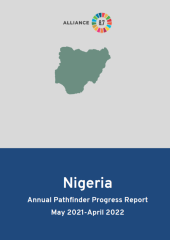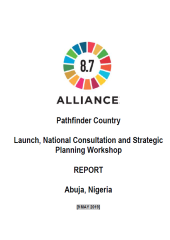Learn more about Nigeria
Priorities
- Ensure national compliance with existing codes of conduct and standards of procedures. The National Policy on Child Labour and the National Action Plan on the Elimination of Child Labour must be reviewed and adapted, and national codes of conduct and standards of procedures must be reviewed or developed. Child labour data should be collected and regularly updated. Supply chains should be monitored regarding child labour, and products should be certified.
- Strengthen child labour prevention, withdrawal, and rehabilitation mechanisms. Livelihood supports—an alternative to the income from child labour—should be provided for parents of victims of child labour. Educational support services and life skills and vocational training should be provided to children involved in or at risk of child labour. The capacity of the Child Labour Unit as well as labour inspectors should be strengthened.
- Develop effective institutional arrangements for awareness-raising and mass mobilization against child labour. Workers and employers should be jointly sensitized about child labour in supply chains and supported through the development of targeted information materials. Steering committees should be established at the levels of local governments and communities, and referral centers for case management should be created.
- Strengthen policy, coordination, and cooperation structures among state and non-state actors at all levels on regular and irregular migration. Normative guidance is required to advance the implementation of global policy instruments by Member States. Coordination structures at the federal and state levels must be strengthened to prevent trafficking, protect victims, and provide sustainable rehabilitation and reintegration support.
- Provide enhanced victim-centered and gender-sensitive rehabilitation and reintegration support to victims of trafficking and other vulnerable returnees. The capacity of relevant stakeholders must be strengthened to provide comprehensive assistance and care at all levels. The coordination of services and referral mechanisms to assist victims of trafficking and other returnees should be improved.
- Enhance the legal and criminal justice response for preventing and combating trafficking in persons. The capacity of judges, prosecutors, law enforcement agents, border guards, and front-line officers on investigation, prosecution, adjudication, and victim and witness protection must be reinforced. Regional and international cooperation on mutual legal assistance and other relevant procedures should be facilitated.
- Enable migrants, potential migrants, and the community to make safe and informed knowledge-based decisions on migration. Awareness-raising efforts should be implemented at the grassroots level to prevent trafficking and promote safe and regular migration pathways. The evidence base on migration and trafficking should be enhanced.
- Improve social safety nets in conflict and disaster-affected communities. To provide more effective social protection to vulnerable populations, the school-feeding programme should be extended to camp schools. Other social protection mechanisms should be promoted.
- Enhance community mediation and peacebuilding efforts. The capacity of peacebuilding structures in the relevant local government areas should be strengthened. Children associated with armed forces and armed groups should be de-radicalized and reintegrated.
- Strengthen public-private partnerships to rebuild community infrastructure. Collective efforts should be undertaken to revive community life in conflict-affected areas and provide basic infrastructure, including water, roads, markets, and power supply.
- Increase collaboration with major counter-terrorism, conflict, humanitarian and disaster stakeholders. Addressing the root causes of child labour and trafficking requires the engagement of a wide range of actors, in order to ensure the holistic provision of services.
Progress
- Successful completion of the National Child Labour and Forced Labour Survey. The result of the survey has been analyzed, validated and the report writing concluded (a zero draft is ready).
- The Federal Executive Council has approved the Labour Standard Bill for the protection of children within the workplace, aligned with the International Labour Standard, the Labour Standard Bill provides for the minimum age of employment to be 15 years and for the enforcement of the Hazardous Child Labour List.
Migration
Improved policy coordination and cooperation structures amongst state and non-state actors in Nigeria and the region, as well as harness positive contributions of migration to development.
- Policy actions are developed to support the Implementation of the Global Compact for safe, orderly and regular migration
- Coordination structures at federal, state and LGA levels are strengthened to provide sustainable rehabilitation and reintegration support
State and non-state actors provide enhanced victim-centered and gender-sensitive rehabilitation and reintegration support to victims of Trafficking and other vulnerable returnees exposed to violence exploitation and abuse.
- The capacity of stakeholders strengthened to provide comprehensive assistance at all care levels: Provided trauma healing sessions for returnees to enable them get back on track; conducted at least 4 trainings and linked returnees to the federal government
Migrants, potential migrants, and the larger community are able to make safe and informed knowledge-based decisions on migration.
- Awareness raising efforts are implemented at the grassroots level and enhanced evidence-based data on migration, Trafficking in Persons (TiP) and Smuggling of Migrants (SoM), is available to guide future intervention efforts
Humanitarian and Conflict Setting
Social Safety nets in conflicts and disaster affected communities enhanced.
- Increased awareness on human trafficking, child labour and abuse in 25 endemic local government areas
- Basic school enrollment and retention strengthened in 25 endemic local government areas
- Livelihood skills training initiatives cascading actions to financial literacy, vocational and economic life skills: Conducted at least four trainings and linked returnees to the federal government AGSMEIS program for funding to start up their business.
Community mediation and peace-building process enhanced
- In 50 conflict affected local government areas, the capacity of the peace – building structures are strengthened:
- Children associated with Armed Forces and Armed Groups (CAAFAG) in 50 conflict affected local government areas de-radicalized and reintegrated
Supply Chain
National Compliance to existing codes of conduct and standard of procedures.
- Child Labour mainstreamed into national codes of conduct and standard of procedures
- Adoption of a revised Labour Act which mainstreams gender and child labour
- Situational analysis of supply chain and stakeholders’ mapping conducted
- Certification of products from cocoa and mining supply chains for compliance with international standards in the elimination of child labour, forced labour, human trafficking and modern-day slavery
- Monitoring framework on the elimination child labour in supply chains is strengthened
- The capacity of stakeholders strengthened to respond to the elimination of child labour in supply chains
- Holding a meeting of the project advisory committee strategic meeting
- Meeting of the national steering committee on the elimination of child labour and presentation of ACCEL Africa update
Alternative livelihood support to parents of victims of child labour, forced labour, human trafficking and modern-day slavery provided (inclusive of vulnerable persons)
- Capacity of Child Labour Unit and Labour Inspectors in the areas of identification and withdrawal of child labour victims
- Support the adoption of NAP at the state level in Nigeria (Priority will be on the project states)
- Set up Regional Action Plan (RAP) on the elimination of child labour
Building Effective institutional arrangement for awareness creation and mass mobilization against Child Labour, Forced Labour, Human Trafficking and Modern Slavery
- Referral Center established by building an Alliance 8.7 thematic area Information Management Portal using Case Management Approach
Child labour
- The Ministry of Labour developed and produced a Jingle on the evils and ills of Child Labour and the need for its elimination in the country during the reporting period of June 2019- May 2020.
- 18 victims of trafficking were supported with vocational/ economic life skills and starter kits at the household level by the International Organization on Migration (IOM) during the reporting period of June 2019- May 2020.
- The Ministry of Women Affairs’ Child Development Department and the United Nations Children’s Fund (UNICEF) at the Federal and State levels and other stakeholders in 2019 provided medical care kits, economic empowerment and training on Gender-Based Violence (GBV) and Sexual Exploitation and Abuse (SEA) where over 457,353 vulnerable women and children became aware of their; dignity, health needs and strategies for discerning/avoiding sexual exploitation tendencies and violence.
Human trafficking
- In 2019, the United Nations Fund for Population Activities (UNFPA) supported the Federal and affected State Ministries of Women Affairs in partnership with the National Emergency Management Agency (NEMA) and affected State Emergency Management Agencies (SEMA) to reach out to flood victims with over 5700 relief items for women girls and pregnant women, including dignity kits and sleeping mats in temporary locations and local wrappers for the women in at least 5 states.
- In 2019, the Ministry of Labour strengthened the inspection system by recruiting additional staff and bringing the total number of Labour Officers to 1,415 and Factory Officers to 724. Thereby increasing the number of Labour Inspections and Child Labour specific inspections nationwide. Out of these inspections, a total of 3,937 Child Labour violations were detected with 1,263 withdrawn from Child Labour and 1,494 children and their families empowered.
International Instruments
| Zone | Ilo Instrument | État | Ratification date | CEACR comments |
|---|---|---|---|---|
| Child Labour | C138 Ratification of C138 - Minimum Age Convention (1973) |
In Force | 02 Oct 2002 | |
| Child Labour, Forced Labour, Human Trafficking, Modern Slavery | C182 Worst Forms of Child Labour Convention (1999) |
In Force | 02 Oct 2002 | |
| Child Labour, Modern Slavery | C029 Forced Labour Convention (1930) |
In Force | 17 Oct 1960 | |
| Forced Labour, Modern Slavery | C105 Abolition of Forced Labour Convention (1957) |
In Force | 17 Oct 1960 | |
| Child Labour, Forced Labour, Human Trafficking, Modern Slavery | C143 Migrant Workers (Supplementary Provisions) Convention (1975) |
In Force | 23 Mar 2023 | |
| Child Labour, Forced Labour, Human Trafficking, Modern Slavery | C181 Private Employment Agencies Convention (1997) |
In Force | 23 Mar 2023 | |
| Freedom of Association | C087 Freedom of Association and Protection of the Right to Organise Convention (1948) |
In Force | 17 Oct 1960 | |
| Freedom of Association | C098 Right to Organise and Collective Bargaining Convention (1949) |
In Force | 17 Oct 1960 | |
| Discrimination | C100 Equal Remuneration Convention (1951) |
In Force | 08 May 1974 | |
| Discrimination | C111 Discrimination (Employment and Occupation) Convention (1958) |
In Force | 02 Oct 2002 | |
| Occupational Safety and Health | C155 Occupational Safety and Health Convention (1981) |
In Force | 03 May 1994 | |
| Occupational Safety and Health | C187 Promotional Framework for Occupational Safety and Health Convention (2006) |
In Force | 08 Nov 2022 |
| Zone | UN Treaty | Signature date | Ratification date | État |
|---|---|---|---|---|
| Child Labour | IV-11 Convention on the Rights of the Child (1989) |
26 Jan 1990 | 19 Apr 1991 | |
| Child Labour | IV-11-c Optional Protocol to the Convention on the Rights of the Child on the sale of children, child prostitution and child pornography (2000) |
8 Sep 2000 | 27 Sep 2010 | |
| Forced Labour, Human Trafficking | PALERMO_PROTOCOL Protocol to Prevent, Suppress and Punish Trafficking in Persons, especially Women and Children, supplementing the United Nations Convention against Transnational Organized Crime (2000) |
13 Dec 2000 | 28 Jun 2001 | |
| Human Trafficking, Modern Slavery | XVIII-4 Ratification of the Supplementary Convention on the Abolition and of Slavery, the Slave Trade and Institutions and Practices Similar to Slavery (1956) |
26 Jun 1961 d |
Milestones
RESOURCES

Nigeria Annual Pathfinder Progress Report May 2021-April 2022
